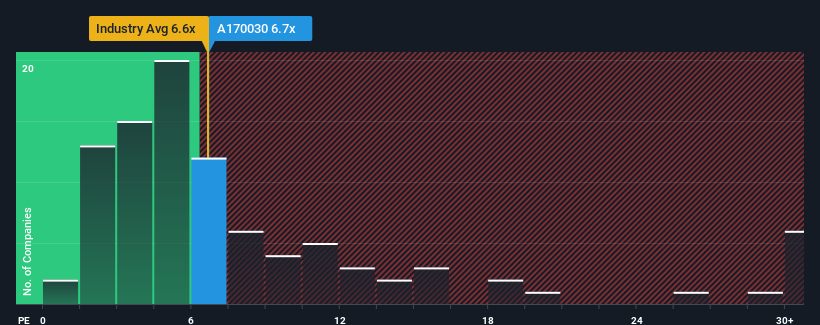- South Korea
- /
- Auto Components
- /
- KOSDAQ:A170030
Why Investors Shouldn't Be Surprised By Hyundai Industrial Co., Ltd.'s (KOSDAQ:170030) 26% Share Price Plunge

Hyundai Industrial Co., Ltd. (KOSDAQ:170030) shareholders that were waiting for something to happen have been dealt a blow with a 26% share price drop in the last month. Instead of being rewarded, shareholders who have already held through the last twelve months are now sitting on a 29% share price drop.
Although its price has dipped substantially, given about half the companies in Korea have price-to-earnings ratios (or "P/E's") above 12x, you may still consider Hyundai Industrial as an attractive investment with its 6.7x P/E ratio. Nonetheless, we'd need to dig a little deeper to determine if there is a rational basis for the reduced P/E.
For example, consider that Hyundai Industrial's financial performance has been poor lately as its earnings have been in decline. One possibility is that the P/E is low because investors think the company won't do enough to avoid underperforming the broader market in the near future. If you like the company, you'd be hoping this isn't the case so that you could potentially pick up some stock while it's out of favour.
Check out our latest analysis for Hyundai Industrial

What Are Growth Metrics Telling Us About The Low P/E?
Hyundai Industrial's P/E ratio would be typical for a company that's only expected to deliver limited growth, and importantly, perform worse than the market.
If we review the last year of earnings, dishearteningly the company's profits fell to the tune of 21%. As a result, earnings from three years ago have also fallen 13% overall. So unfortunately, we have to acknowledge that the company has not done a great job of growing earnings over that time.
In contrast to the company, the rest of the market is expected to grow by 31% over the next year, which really puts the company's recent medium-term earnings decline into perspective.
With this information, we are not surprised that Hyundai Industrial is trading at a P/E lower than the market. Nonetheless, there's no guarantee the P/E has reached a floor yet with earnings going in reverse. Even just maintaining these prices could be difficult to achieve as recent earnings trends are already weighing down the shares.
The Bottom Line On Hyundai Industrial's P/E
Hyundai Industrial's recently weak share price has pulled its P/E below most other companies. It's argued the price-to-earnings ratio is an inferior measure of value within certain industries, but it can be a powerful business sentiment indicator.
We've established that Hyundai Industrial maintains its low P/E on the weakness of its sliding earnings over the medium-term, as expected. At this stage investors feel the potential for an improvement in earnings isn't great enough to justify a higher P/E ratio. Unless the recent medium-term conditions improve, they will continue to form a barrier for the share price around these levels.
We don't want to rain on the parade too much, but we did also find 2 warning signs for Hyundai Industrial that you need to be mindful of.
If these risks are making you reconsider your opinion on Hyundai Industrial, explore our interactive list of high quality stocks to get an idea of what else is out there.
If you're looking to trade Hyundai Industrial, open an account with the lowest-cost platform trusted by professionals, Interactive Brokers.
With clients in over 200 countries and territories, and access to 160 markets, IBKR lets you trade stocks, options, futures, forex, bonds and funds from a single integrated account.
Enjoy no hidden fees, no account minimums, and FX conversion rates as low as 0.03%, far better than what most brokers offer.
Sponsored ContentValuation is complex, but we're here to simplify it.
Discover if Hyundai Industrial might be undervalued or overvalued with our detailed analysis, featuring fair value estimates, potential risks, dividends, insider trades, and its financial condition.
Access Free AnalysisHave feedback on this article? Concerned about the content? Get in touch with us directly. Alternatively, email editorial-team (at) simplywallst.com.
This article by Simply Wall St is general in nature. We provide commentary based on historical data and analyst forecasts only using an unbiased methodology and our articles are not intended to be financial advice. It does not constitute a recommendation to buy or sell any stock, and does not take account of your objectives, or your financial situation. We aim to bring you long-term focused analysis driven by fundamental data. Note that our analysis may not factor in the latest price-sensitive company announcements or qualitative material. Simply Wall St has no position in any stocks mentioned.
Have feedback on this article? Concerned about the content? Get in touch with us directly. Alternatively, email editorial-team@simplywallst.com
About KOSDAQ:A170030
Hyundai Industrial
Manufactures and sells automotive seat components in South Korea and internationally.
Excellent balance sheet second-rate dividend payer.
Market Insights
Community Narratives




